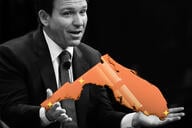You have /5 articles left.
Sign up for a free account or log in.
I spent a couple of weeks in January nursing a gloom-inducing inferiority complex. I was part of a team of academics reviewing applications for the most prestigious national fellowship in my field.
Only about 7 percent of applicants will get the award. Of the 35 or so candidates I reviewed, the few that I recommended for funding were simply stunning in their talent and achievement. The others, those unfortunate souls whom I voted to reject, suffered from being merely staggeringly good. They all seemed to have obtained 4.0 averages at elite institutions, written publishable senior theses and conducted summer research with world-famous scholars.
Who was I to sit in judgment of these people? I felt like a flabby Roman emperor giving a thumbs-down to the gladiator who was slightly less preternaturally strong and agile than the one who held the sword at his throat. I mean, I sure as hell couldn’t beat any of them. But besides the ache in my deflating ego was the discomfort of knowing that, while the applicants we were funding may have deserved it the most, they were also those who needed it the least. We weren’t making graduate school available to students who couldn’t afford it. We were simply pouring money into a handful of the world’s wealthiest universities.
I think of myself as a noncommissioned intellectual. Most of my job involves teaching economics at a small, academically respected liberal arts college with strong, highly motivated students. It’s a good job, and I like it.
Teaching is not all I do; Google Scholar tells me that my publications have been cited a few hundred times. But an economist my age at a research university will have thousands of citations, and the top economists will have tens of thousands.
So I am not one of the generals, so to speak, who lead the troops in our discipline, directing them to some new set of economic ideas. Nor am I a colonel supervising those early-career officers who might one day be generals. I am a sergeant.
I have been a sergeant for 33 years. I train the new recruits, the youngest enlisted personnel, only a few of whom will decide on an academic career. I think I’m a good sergeant, and good sergeants are valuable, as any general will tell you. But it feels odd for a sergeant to be identifying the next generals. I suppose I was recruited to this job because a flag officer’s time is too valuable to spend on this.
Interestingly, among the fellowship applicants -- the future generals, colonels and (at least) captains -- I spotted someone I thought would make a fine sergeant. It surprised me and made me think, “What are you doing here?” Like me, this person had been a good but not great student at an uncelebrated state institution and was not even an economics major. (My B.A. is in political science.) Unlike me, however, she had been compelled to support herself all the way through college. She had to overcome extraordinary personal challenges to arrive at graduate school, and remarkably, she did. The graduate program she enrolled in wasn’t at Stanford or Harvard, but it could produce great sergeants, and maybe once in a while a major or a colonel. And federally supporting this student might make it possible for the university to enroll another one or two.
Naturally, however, I did not propose funding for this potential sergeant. I wasn’t supposed to be looking for sergeants -- I was supposed to be looking for colonels and generals. To be sure, these fellowships take into account applicants’ special circumstances and try to be inclusive with respect to race and gender. But I couldn’t bring myself to recommend a merely good record over a batch of phenomenal ones.
In some ways, that is unfortunate. Without federal funding, the exceptional young scholars will almost certainly get financial assistance from one of the elite institutions. The federal fellowship doesn’t enable them to go to graduate school; it merely relieves Princeton or Yale of having to dip into their massive endowment returns or sizable research grants to support such top-notch students. In effect, this money makes the rich institutions richer.
I’m not saying it’s a bad idea to direct funding to the supertalented. After all, don’t we want to reward a truly superior performance over a merely excellent or good one? I don’t want to make an appeal for mediocrity.
But we should not delude ourselves that these funds are actually creating opportunities for graduate study. They are not. To actually accomplish that, a bit of the money that is going to fund the best of the best at the most elite institutions should be directed to the less wealthy ones, where Ph.D. recipients become good science teachers and competent researchers (which enhances teaching), but who are not always research stars. Even though few of the new recruits would eventually make general, if those funds supported a wider range of colleges and universities, they might increase the size of our army of scholars.
I am reminded of the title of the movie that made Andy Griffith famous: No Time for Sergeants. I hope that the elite members of the scientific and academic establishments will not take this attitude but will see the worth of supporting some noncoms, as well.




